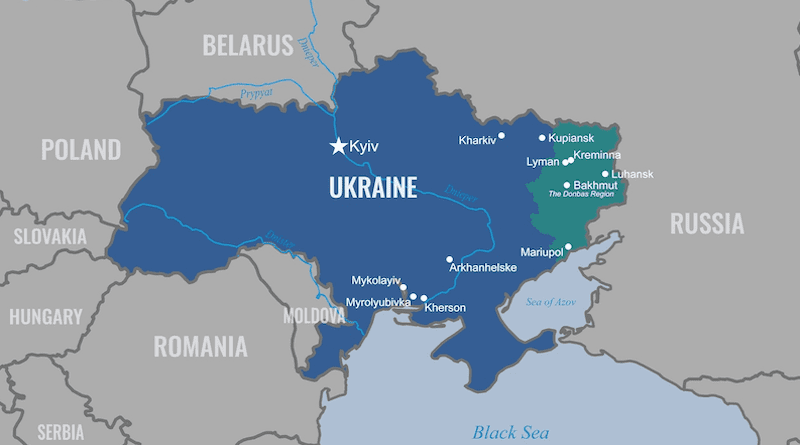Ukraine: Zelenskyy Calls Frontline Situation ‘Especially Tense’ As Russian Attacks Intensify
By RFE RL
(RFE/RL) — Ukrainian President Volodymyr Zelenskiy raised alarms about frontline conditions in the war against Russia, labeling the situation in the eastern Donetsk region as “especially tense” and as hundreds of residents were forced to flee parts of the Kharkiv area in the face of relentless air assaults by the Kremlin’s forces.
“Today, the focus is primarily on the front line – on the situation in our regions where the risks of the Russian offensive actions are the highest,” he said in his nightly video address on May 11.
Zelenskiy stated that “defensive operations” are under way in the Kharkiv region, naming several villages near the border with Russia, and saying his forces were “bravely defending their positions.”
“The situation in the Donetsk region also remains especially tense, particularly in the Pokrovsk direction,” where “it’s extremely difficult.”
Hundreds of civilians were forced to evacuate their homes in Kharkiv region in the northeast on May 11 as Russian shelling continued and the Ukrainian military declared an air alert over most of the country.
Kharkiv Governor Oleh Syniehubov was quoted as saying at least three people had been killed as artillery and other fire struck dozens of towns and villages.
Officials said around 1,700 people were being evacuated.
The Ukrainian General Staff early on May 11 cited more than 100 areas of fighting in the past 24 hours, in addition to overnight missile and drone attacks, hinting at the intensity of the Russian campaign 27 months into the full-scale invasion.
On May 10, Russian troops attempted to open a new front by breaking through Ukrainian lines in the northeastern Kharkiv region, a move Kyiv said its forces repelled, though fighting was reported to be continuing.
Ukraine’s military was reportedly speeding reinforcements to the area.
Residents of the Ukrainian town of Vovchansk near the Russian border expressed shock over what they said were overnight air strikes by Russian forces and resulting shortages of food, water, and fuel. Vovchansk, with a prewar population of about 17,500 people, is northeast of Kharkiv and about 6 kilometers from the border.
“It has already become really scary. All life is here: my grandchildren, children,” Antonina Kornuta told RFE/RL. “I don’t want to evacuate.”
Valeriy Dubskiy told RFE/RL that “water sources are far away and people must wait in long lines. You cannot get water after such bombardment. We are running away from the shelling, from the bombardment, from death — from the Russian death.”
Another female resident said that “planes dropped a lot of bombs on the town during the night. It looked as if the sky had exploded. It was very scary, very noisy.”
Ukrainian President Volodymyr Zelenskiy said on May 10 that “it is critical that partners support our warriors and Ukrainian resilience with timely deliveries. Truly timely ones.”
Pledges of U.S. and other Western aid have recently accelerated dramatically after a slowdown over months of political differences.
Russia’s Defense Ministry on May 11 claimed to have captured six border communities around Kharkiv — Pletenivka, Ohirtseve, Borysivka, Pylna, and Strilecha — and the village of Keramik in the Donetsk region.
But the Ukrainian side did not confirm such losses and RFE/RL could not independently verify the Russian assertion.
The Ukrainian Air Force announced an air alert over most of the country before noon on May 11, citing a “threat of ballistic weapons” in many areas.
Citizens were urged to seek shelter in civil-defense sites or find other relative safety.
Russia has expanded its use of advanced rockets and missiles in addition to barrages from unmanned attack drones and recently has specifically targeted power infrastructure even far from the front lines.
Moscow denies targeting civilians, but Russian air strikes have frequently hit hospitals, schools, and residential areas with devastating effect.
The head of the regional military administration in the southern port city of Kherson said Russian shelling had killed at least one man there.
Russia-backed officials in the eastern Ukrainian region of Donetsk on May 11 said three people were killed and eight others injured in a missile strike on Donetsk city, which has been under control of Moscow-backed separatist forces since 2014.
Denis Pushilin, the Kremlin-appointed head of the occupied Donetsk region, claimed in a Telegram posting that a Ukrainian missile struck a restaurant.
Earlier, Kremlin-installed officials in Luhansk, also mostly occupied by Russian forces, said an attack by Ukrainian forces on an oil depot in the town of Rovenky late on May 10 killed three people and injured seven more and set off a large fire.
RFE/RL could not independently confirm the Russian reports on Luhansk, which quoted separatist regional leader Natalia Pashchenko and Moscow-installed Governor Leonid Pasechnik.
It was the second reported attack on a Luhansk oil storage facility in three days that Pasechnik has blamed on U.S.-supplied Army Tactical Missile Systems (ATACMS), without providing evidence. The earlier attack, in the city of Luhansk, injured five people.
Meanwhile, the governor of Russia’s southwestern region of Belgorod said on May 11 that several villages had come under Ukrainian fire that damaged dozens of houses and caused dozens of casualties.
Vyacheslav Gladkov said a woman was killed and 29 others received shrapnel wounds. Five villages were reportedly left without electricity.
The Kursk region’s governor, Roman Starovoit, said two drones were intercepted over that region.
Russia’s Defense Ministry said nine drones and 21 missiles had been downed over Belgorod and seven more drones intercepted over the Kursk and Volgograd regions.

